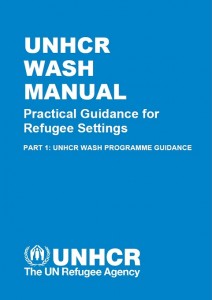 The UNHCR WASH Manual (2017) is the result of an open and collaborative process with WASH actors who have active programmes supporting refugees. It has been written primarily for use by UNHCR staff, WASH actors, national governmental authorities, emergency response coordinating bodies, contingency planners, programme evaluators, and is a useful reference for any individuals or organisations involved in providing WASH services in refugee settings.
The UNHCR WASH Manual (2017) is the result of an open and collaborative process with WASH actors who have active programmes supporting refugees. It has been written primarily for use by UNHCR staff, WASH actors, national governmental authorities, emergency response coordinating bodies, contingency planners, programme evaluators, and is a useful reference for any individuals or organisations involved in providing WASH services in refugee settings.
The manual outlines WASH guidelines that should be met in all refugee settings to provide an adequate level of basic WASH services for refugees. The manual does not aim to be a detailed technical WASH manual, but instead aims to present..
- A general description of overarching principles that should be considered in all refugee WASH programmes;
- A simple overview of WASH technical options that are suitable for refugee settings including a description of their advantages, disadvantages and related UNHCR policies;
- Where to find more detailed UNHCR approved technical design and operational information (e.g. from existing WASH technical documentation).
The manual should be used in practically all refugee situations, where UNHCR operates including low middle-income and high-income countries, emergencies, protracted situations, and eventually repatriation or any other durable solution identified. The focus of the manual is on refugees, but in some contexts, may apply or be adapted to asylum-seekers, stateless persons, internally displaced and
returnee settings.
UNHCR WASH MANUAL FOR REFUGEE SETTINGS
PART 1: UNHCR WASH PROGRAMME GUIDANCE download here: UNHCR WASH MANUAL Part 1
1. UNHCR WASH PROTECTION PRINCIPLES
2. WASH STRATEGY AND OPERATIONAL PLANS
3. WASH SECTOR COORDINATION
4. WASH ASSESSMENTS
5. WASH MONITORING AND REPORTING
PART 2: UNHCR WASH TECHNICAL GUIDANCE (coming soon)
6. WASH AND PUBLIC HEALTH
7. WATER SUPPLY
8. EXCRETA MANAGEMENT
9. HYGIENE PROMOTION
10. SOLID WASTE MANAGEMENT
11. DISEASE VECTOR CONTROL
 English
English
